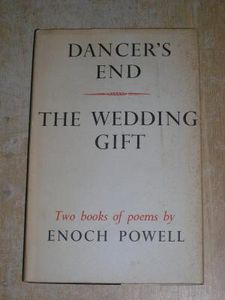Signed by author
From Wikipedia:
John Enoch Powell, MBE (/ˈdʒɒn ˈiːnɒk paʊl/; 16 June 1912 – 8 February 1998) was a British politician, classical scholar, linguist, and poet. He served as a Conservative Member of Parliament (MP, 1950–74), Ulster Unionist Party (UUP) MP (1974–87), and Minister of Health (1960–63).
Before entering politics, Powell was a classical scholar, becoming a full professor of ancient Greek at the age of 25. During the Second World War, he served in both staff and intelligence positions, reaching the rank of brigadier in his early thirties. He also wrote poetry, his first works being published in 1937, as well as many books on classical and political subjects.
controversial British M.P.'s book of poems, whose 'Rivers Of Blood' speech, branded him racist, although Powell denied this accusation repeatedly and prompted Edward Heath to demand his resignation from the Conservative Pa rty's Shadow Cabinet. Dancer's End, poems written by Powell during the Second World War and The Wedding Gift, composed during the summer of 1950, show a mature poet, after the publication of his first two poetry collections, First Poems and Casting Off. Powell's death in 1998, brought this tribute from former Prime Minister Margaret Thatcher, "There will never be anybody else so compelling. He had a rare combination of qualities all founded on an unfaltering belief in God, an unshakable loya l ty to family and friends, an unswerving devotion to our country. He was magnetic. Listening to his speeches was an unforgettable privilege. He was one of those rare people who made a difference."
During October 1939, almost a month after returning home from Australia, Powell enlisted in the Royal Warwickshire Regiment. Rather than waiting to be called up, he claimed to be Australian, as they were allowed to enlist straight away.[14]:39 In a poem, he wrote of men joining the army like "bridegrooms going to meet their brides", but his biographer points out that it is unlikely that other men shared his joy.[14]:39
